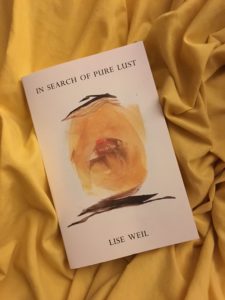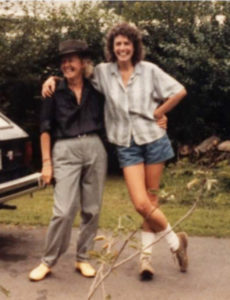“In Search of Pure Lust is more than a meditation on queer identity. It’s an incredible coming-of-age memoir that claims a woman’s right to be herself, wherever and whenever she may be. Weil’s writing is smooth, polished, and lovely. Pure Lust explores a wide range of emotions and experiences, from laugh-out-loud moments to love scenes that take your breath away. Weil develops into a self-aware, sophisticated woman. Her humor is counterbalanced with deep, moving insights about her family and her changing role as a daughter, partner, and teacher.” —Claire Foster
Excerpt:
The year is 1986. The narrator’ s dream of a house filled with women doing their creative work has come true— Trivia, the feminist journal she edts, has drawn guests from as far away as Australia. But alas, though she is aware of and glad for the important conversations swirling around her, her thoughts are mainly with her current girlfriend – who is living in NYC with a man.
Nothing is foreseen, for we do not know what becomes
of the image of the state of the world
when the patience of mouths lays being bare
— Nicole Brossard, Sous la langue/ Under Tongue
 Ever since Jane and Zoey’s visit to Leverett five years earlier, when the old farmhouse swelled to bursting with the music of friends reciting poems and weaving strands of thought in passionate conversation, I had dreamt of living in a house filled with women I loved. Each woman would have her own room, where she would spend the day absorbed in her work—creative work, work for women, work that sustained us all.
Ever since Jane and Zoey’s visit to Leverett five years earlier, when the old farmhouse swelled to bursting with the music of friends reciting poems and weaving strands of thought in passionate conversation, I had dreamt of living in a house filled with women I loved. Each woman would have her own room, where she would spend the day absorbed in her work—creative work, work for women, work that sustained us all.
For a few weeks in late summer of ’86 that dream edged close to fulfillment. Teddy, my architect friend, was putting up a deck over the marshy area in the back of the house and had moved into the big bedroom upstairs. In the little room with the futon was Barbara Walsh, the Australian woman Helen and I had met at Amelia’s. Barbara had parted from her lover to spend the last month of her American tour in my old farmhouse in Massachusetts—in “radical feminist heaven†as she put it—helping out with Trivia #9. And on weekends, Brett drove up from Northampton and took over the third bedroom upstairs.
Talk would begin kindling between me and Brett, stationed at the kitchen table with beer, a bowl of chips and a stack of manuscripts. Talk stoked by the material in that stack, or, just as often, by what was missing from it. It was only a matter of time before Barbara would come downstairs, and soon the three of us would be lighting cigarettes and conversing feverishly around the table. Often Teddy would drop her sawing and hammering to join in.
Each of us brought her own shit-kicking ideas to the table. Barbara, who had five children back in Australia, was hard at work on a radical critique of traditional motherhood. And Teddy had just finished a thesis on Pueblo architecture and Wittig’s The Lesbian Body; she’d been feeding us little bits on her work breaks. Like indigenous dwellings, went her argument, Wittig’s writing inspired us to imagine ourselves outside of the built world with its divisions between inside and outside, private and public, human and nature.
I was full of the possibilities of lesbian writing myself, having just returned from the 2nd International Feminist Book Fair in Oslo, which ended with an evening of lesbian erotic readings in five different languages. With great relish I recapped the highlights of that evening for my housemates: Daphne Marlatt and Betsy Warland, two tall, radiant Canadian poets taking turns reading poems about their lovemaking on a train moving through the Australian outback, their bodies echoing the wild landscape (Barbara, who knew the outback, was enthralled). Nicole Brossard bringing the house down at the end with her long poem Sous la langue/Under Tongue in which a lover’s mouth approaches the body she desires, launching her into the unknown.
One weekend in August, Brett and I sat across from each other at the kitchen table with the galleys for Sonia Johnson’s latest book, Going out of Our Minds, between us. I had wrangled them from her at a conference in Amherst where she’d spoken the day before, hoping to find an excerpt for this issue. In it, Johnson argued it was time to rethink our ideas about political action. Our habitual modes of protest weren’t working; in fact, if the state of the world was any evidence, they actually served to fortify what we were trying to resist. Like Mary Daly’s spider in freefall, she insisted, we needed to launch ourselves into space, trusting our own powers of reinvention. And to do that, we needed to go out of our patriarchal minds.
Brett hadn’t looked at the galleys yet, but on the basis of what I’d told her of the book, she was wary. Was Sonia suggesting we should just leave abusers of power, violators of human rights and freedoms, to their own devices? Allow the powerless, the marginalized, the voiceless, to get mowed under? Barbara and Teddy—who had made excuses to join us at the table and were sneaking peeks at the galleys as we spoke—now looked expectantly my way.
I reminded them that it had been less than four months since the Chernobyl plant had sent a giant nuclear cloud into the atmosphere. In Bavaria, where I’d spent time after the Book Fair, I’d heard grim tales of fruits and vegetables in gardens and fields now unsafe to eat, of women fearing for their unborn children. In the short run, I was sure Sonia would say, yes, we needed to go on resisting oppressive forces as we’ve always done. But given that the insanity out there was intensifying, was there any doubt that new modes of thought and new forms of action were called for?

Lise and Barbara Walsh, 1986
“I’m all for going out of our patriarchal minds,†Barbara said. “But how do we do that?†A Taurus, she always wanted practical explanations.
“We already are doing it,†said Brett. “Just by living in a lesbian body.â€
“That is,†I said, “if you haven’t jumped on the lesbian mother bandwagon.â€
“Well, but maybe they’re doing motherhood differently,†Brett argued.
“If they ever read my book they damn sure will!†Barbara said.
“And if they ever read The Lesbian Body,†Teddy said, “they’ll get a taste of what they’re missing.â€
….
Lise Weil is an award-winning editor and translator. Her essays and literary nonfiction have been published widely in Canada and the U.S. She was founding editor of Trivia: A Journal of Ideas (later Trivia; Voices of Feminism) and more recently of Dark Matter: Women Witnessing and teaches in the Goddard Graduate Institute. Born in Chicago, she moved to Montreal in 1990.



Your piece brought back many thoughtul,gynergetic, and fun memories. Still going out of our patriarchal minds! My favorite recent example: a friend passed along pics from WomenCrafts in Ptown (still there!)of buttons & art proclaiming “Mermaids Against Mysogyny!†â€â™€ï¸ Must take a sign with that to our next SoCal March. Emily